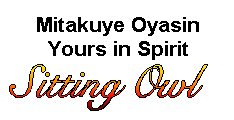|
Main
Menu
External
Pages
|
Sitting Owl’s
Book Review
‘The
Healing Spirit
– Explorations in Religion and Psychotherapy’
By: Paul R.
Fleischman Compiled
  
Now
Playing: 'I
Am Your Friend'
By: Joanne
Shenandoah
I would like to begin this review with the comments from the back cover.
"Religion kindles much of
the world’s healing, soothing, care-taking forces; yet ironically it
also spawns cruel, violent, destructive hatred. Through a series of
vividly detailed case studies, The Healing Spirit explores this paradox
along with the interrelationship of mankind’s universal psychological
needs and the major themes of the religious path. Paul Fleischman blends
psychiatric insight, a profound respect for the world of spirit, and a
rich sweep of cultural allusion into a fresh, masterful unity."
The author begins his introduction saying that: “Religion
can be approached and understood as one aspect of personality”.
This is indeed my own understanding, and I believe that when we can
understand the big picture of life’s religious (Latin religio meaning linking back to the
source), and psychological nature and then develop a social order based on
it, we can all live harmoniously with the universe. However this big
picture must also be experienced in the everyday life, which the author
then acknowledges by quoting Mircea Eliade, the great historian of
comparative religion that I have previously mentioned, thus: “Religion is an experience of
the existence in totality… and the exemplary solution of every
existential crisis.”
The author finishes his introduction thus:
“I will describe religion as a
circle with ten segments forming a whole and containing: witnessed
significance, lawful order, affirming acceptance, a calling, membership,
release, a worldview, human love, sacrifice, and meaningful death.”
WITNESSED SIGNIFICANCE is what I
spoke about in my article ‘Initiations and Vision Quests'. It is the
need to be seen, known, responded to, confirmed, appreciated, cared for,
mirrored, recognised, and identified; and this need is universal and
mythologically based.
LAWFUL ORDER is our need to know
that the unknowable universe is not our prison, but is a wonderment that
has got rules to the unfolding game of life. Lawful order is symbolised
as a law-giving, protective father, who gives us security, but also
demands that we manifest the rules in our own actions. Universally this
is the Father-in-Heaven, God the father, Wakan-Tanka the father and
Creator.
AFFIRMING ACCEPTANCE is the need to
feel integral and unified within oneself and the need to feel
responsible, an active agent of choice, and a point of origins. “Yet there is a need to feel
pardoned, having done enough, tried enough, succeeded enough, and when
finished, to feel done and complete… This need is usually referred to
as “wholeness,” but to highlight its dynamic, tensile quality, I call
it ‘affirming acceptance’.” This is
the area that religion plays the major role. The Western religions are
heavy with sin and atonement, telling us we have been bad, and weak, that
with them is Another who can save us and set free the past. “Repent, be reborn whole and
new.”
In Buddhism and some schools of Hinduism 'affirming acceptance' is
achieved by the withdrawal of one’s personal wants and desires.
CALLING has two steps to it; firstly
the calling to your life’s task (Dharma) or duty as an inner command
from God, and secondly the acceptance of the call, even if it is socially
unpopular. The duty aspect is right for a culture from the East, where
you are born into
your Dhama, but I
prefer to see the
calling to be to
your Bliss; the
realisation of your
BLISS (Your True
Being) comes only
when you can live
any passing moment
of your life without
being influenced by
any FEARS, DESIRES,
or SOCIAL DUTIES to
live any particular
way! Psychologically, this brings in the concept of identity. The
author here sheds light on the dilemma of divine uniqueness of the
individual verses the sense of divine duty (Dharma) as a separation from
uniqueness, the self that is identical in everyone. A person’s career
may be their calling, but generally career prominence has nothing to do
with calling. Every man’s foremost task is the actualisation of his
unique, unprecedented and never-returning potentialities.
In shamanism, calling comes as the schizophrenic crack up that Joseph
Campbell speaks of, where consciousness totally falls inward, to God
within. The author speaks of Jung’s own calling, Gandhi’s merging of
calling and Dharma. He wanders through the ‘Rig Veda’, the Bhagavad
Gita, Plato, and Tolstoy’s ‘The Kingdom of God is Within You’, and
Thoreau’s essay ‘On Civil Disobedience’; quoting from it thus: “If
a plant cannot live according to it’s nature, it dies; and so a man.”
MEMBERSHIP is more than ‘witnessed
significance’ or ‘lawful order’, it governs what language we speak
and what we think. “Our habits, values,
thoughts, possessions, our health, food, air, and music are strung out on
lattices of webs reaching from person to person, and for that matter,
from person to soil, plant and animal.”
Religion is one of the fundamental memberships, which expands the
self-group to reach back to first man and first woman, and also into the
future. Religious membership is about seeing the infinite in the finite
and the finite in the infinite, the rejoining of the pairs of opposites
to realise the Creator existing in all of creation, of which you are a
member.
Without a sense of membership a sense of calling can deteriorate into
self-aggrandisement, “in which history becomes
compressed into immediacy, and community shrivels into self, until time
and membership disappear behind a charismatic, melodramatic “me and now”.”
The negative side to membership comes when the group sees itself as the
only form of truth and divinity, and all others as 'the enemy', to be
converted or destroyed. Although this situation can bring healing to
those within the group, it also brings destruction to those outside the
group.
RELEASE is closely related to ‘Religious
Love’ and ‘Meaningful Death. Release is the freedom to let the world
be what it is. “The prerequisite to
attaining release is the faith to let some control slip away.”
The release to let “Thy will be done” can be seen as a negative when
everything is released and one has no will of their own, no self-esteem.
The yearning for release through dependency is a very common human
problem, that is, the obtaining of release at the cost of autonomy. “Surrender to a Guru, to
obtain a sense of release, is probably one of the most wide spread
religious practices in the world.”
While this achieves a sense of release and surrender, it is not the
ultimate release and surrender to the will of God as is the soul’s
seeking and the message of most true Gurus. In the world of Guru worship
a disciple may, along with release, find ‘Witnessed Significance', ‘Lawful
Order’, ‘Affirming Acceptance’, ‘Calling’, ‘Membership’,
‘Worldview’, ‘Human Love’, ‘Sacrifice’, and even a ‘Meaningful
Death’.
Also, “Drugs, alcohol, and
sex, with their capacity for oblivion, are to release as sugar is to
food: they temporarily ease the pains but add no substantial muscle.” The aim of release is to detach from
desire, ambition, worry, guilt, and one’s sense of individuality, and
to experience peace and unity with God the creator and all of creation.
WORLDVIEW is basically the expanded
need of ‘Lawful Order’ to an ordered cosmos, not chaos. “We recognise our own
animation and vitality reflected in limbs of running creatures and the
ceaselessness of leaves and waves.”
Worldview is also the realm of myths and symbols, which serve as templates of reality for others to organise their own worldview.
“Dreams are often the route
to an expanded worldview… they bring together all that has been
experienced, as well as landscapes, characters, and moods that are fresh
creations.”
But the need for worldview can deteriorate into urgent believing. “The
psychedelic era and its offshoot, the spiritual supermarket, were realms
in which worldviews were tried on like new clothes, and discarded.”
A personal worldview comes when one can stand outside oneself, like the
shamans, ecstatic dismemberment, which opens one to the wonder of the
world. “The most important
by-product of a mature worldview is wonder.”
When one becomes more aware of the bigger picture of life, and accepts
their original parents, the All-mother and All-father, one discovers a
worldview that is both painful and ecstatically wonderful.
HUMAN LOVE is the most critical
factor of all the ten divisions. It is the need for communal, parental,
and true person to person love. In the current society of individualism,
an isolating and socially fragmenting force, this love is sought too
concretely and through sexual intimacy. “Among the hurt and pained
in need of help, who may suffer from broken marriages, fluctuating or
fallen self-esteem, obsessive constrictions, panicky attachments to
parents, bewildering isolation, uncontrolled rages, and haunting
depression, the common denominator is an inability to transcend
themselves with care and delight, to reach over and touch another heart.”
In a case study, a patient who had suffered many divorces had; “worshipped
his wives, done all he could for them, and given them all he could of
himself… His marriages were like a calling…[and his] private
religions.” The worship of the Goddess
creates problems because as she embodies and represents the primal forces
of fertility, creation, and manifestation, she also represents death and
annihilation. If there were no life, there would be no death and visa
versa. “A psychotherapist today
will find failed sexual romanticism being used as a splint over broken
bones of human love. The spontaneous re-emergence of Goddess worship may
be one aspect of this phenomenon.”
“Human love is life taking
care of life.’
“Love is the activity of transcending the isolation of self.”
“Love belongs to the between. It is not dramatic, loud, or
congratulatory, but is quiet and invisible.”
Fear must be faced and put in its place, “to
avoid fear is to avoid living” – from
sacrifice comes bliss (see 'Suffering and Compassion...'), but love bears all tings.
SACRIFICE; along with human love are
the important subjects that I have been working on for some time, under
the heading ‘Sacrifice and bliss’ and ‘Suffering and Compassion’
(see 'Suffering
and Compassion...').
“Because everyone will grow
old, decay, and die, suffering is existential… Suffering is the right
arm of love…Sacrifice is the extension of devotion and dedication. It
is the ability to choose what is less than comfortable in order to fulfil
a deeper demand.”
“Where one observer may see a courageous, principled action taken at
great personal cost, a critic may observe it as attention-seeking,
foolhardy notoriety.”
Sacrifice is epitomised in the life of a parent, and is the acceptance
and affirmation of life as it is, even with pain and suffering.
MEANINGFUL DEATH is about living
life to the fullest potential and being prepared to transcend it. Quoting
Stephen Levine, a student of Elizabeth Kubler-Ross (see ‘The Wheel of
Life’ in Vol.1 no.2): “Our fear of death is
directly equatable to our fear of life… whatever prepares you for death
enhances life… focusing on death is a way of becoming fully alive.”
Death is the symbol of loss, transformation and transcendence. Every
second dies with the birth of a new second. “Release and love… always
awaken proximity to death.” Robert J. Lifton has said: “Every significant step in
human existence involves some inner sense of death.”
Awareness of death leads one to search for the eternal, undying spirit of
God living within each and every manifestation of life.


Donations
If you would like to make a donation to Sitting Owl
please use this button.
|